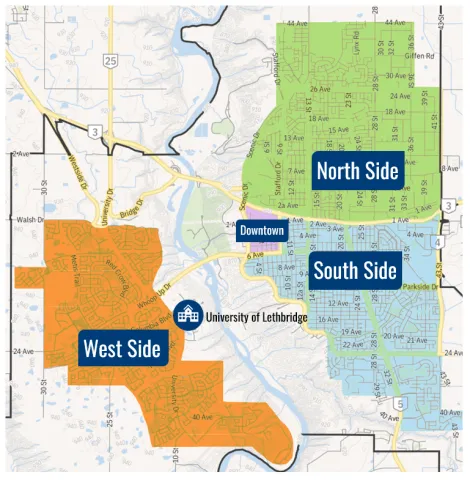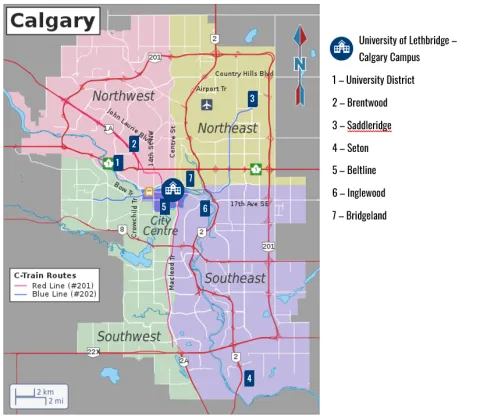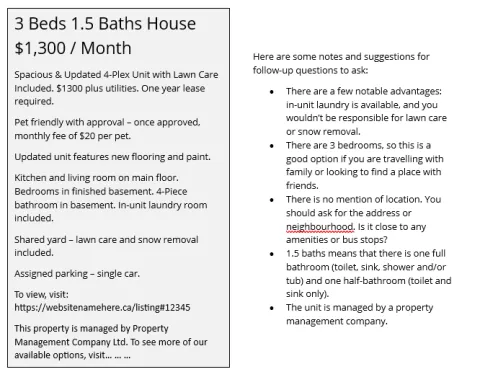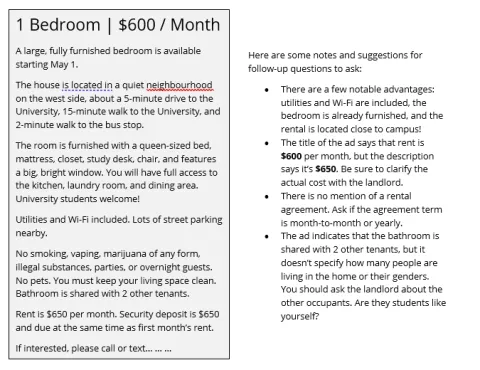Off-Campus Accommodation Guide for International Students
Off-Campus Accommodation Guide
Landlord - The landlord is the owner of the home. They decide the terms of the rental agreement, including rental fees.
Tenant - The person who is renting the home. i.e., you.
Residential Tenancy Agreement - (also commonly referred to as a ‘lease’ or ‘rental agreement’). This is a legal agreement that you and your landlord sign. It contains the terms of the rental agreement, including the monthly rental fee and the expectations for both landlord and tenant.
Security/Damage Deposit - This is a fee (usually the same amount as one month’s rent) paid to the landlord when you sign your rental agreement. The damage deposit is held in case of any damages to the property (stains on the carpets, holes or scratches in the walls, damage to appliances, etc.) during your tenancy. If there are no damages at the end of the rental agreement, this will be returned to you.
Utilities - Services that provide water, heating (gas), and electricity.
You should start looking for your accommodation as soon as your study permit is approved. However, it is a good idea to research in advance to familiarize yourself with the different options and know what you want to look for.
You can start this process while you are outside of Canada.
There are many things to consider when looking for a place to live. When deciding which location is best for you, consider how you will get around. Do you want to live within walking distance to campus? Will you be taking transit? How close is the nearest bust stop? How close is it to places like grocery stores, convenience stores, restaurants, and banks?
Important note: the distance between Calgary and Lethbridge is approximately 2 hours by car. If you are studying at the Calgary campus, look for accommodations in Calgary. If you are studying in Lethbridge, look for accommodations in Lethbridge. It is not possible to commute between Calgary and Lethbridge for classes.
Lethbridge campus students
Lethbridge is a small city of around 100’000 people. The city is split into three areas: north, south, and west. The Old Man River divides the city, separating the west side from the north and south areas.

West Lethbridge
Most uLethbridge students living off-campus find accommodations on the west side of Lethbridge. This is a great option if you want to live close to campus.
Advantages:
- The main (Lethbridge) campus is located on the west side of the city.
- Because of its proximity to campus, there are lots of shared rentals and student apartments available in this area.
- Most essential amenities are available on the west side (supermarkets, convenience stores/gas stations, banks).
Important note: If you choose to live on the west side, you may want to avoid The Canyons, Copperwood, and Riverstone neighbourhoods, as these areas have limited bus service. You can view Lethbridge Transit bus routes here.
South Lethbridge
On Lethbridge’s south side, you’ll find the city’s largest concentration of shops and restaurants. This is a great option if you want to live in a centralized location.
Advantages:
- In addition to all essential amenities, you will also be close to arts and cultural centres, entertainment, restaurants, shopping, etc.
- Downtown Lethbridge is located on the south side. This area is well-connected to the rest of the city by bus.
North Lethbridge
North Lethbridge is home to some residential neighbourhoods, shopping centres, and the city’s industrial area. This area is far from campus. If you are looking for accommodations on the North side, research your commute and consider how long it will take you to travel to campus.
For more information about the city of Lethbridge, including shopping, buying groceries, and entertainment, click here.
Calgary campus students
Calgary is the largest city in Alberta, with a population of approximately 1.4 million people.
The University of Lethbridge – Calgary Campus is located on the 6th floor of the Bow Valley College (BVC) south campus building in downtown Calgary. Our Calgary campus does not offer on-campus accommodations.
There are many neighbourhoods in Calgary to choose from. When selecting a neighbourhood, be sure to factor in the cost and accessibility to public transit.
Here are some options for you to consider:

University District
- Close to the train and lots of amenities. Many students live here.
Brentwood
- Lots of rentals and very student friendly.
Saddle Ridge
- Further north, but still on the train line.
- Many people from Asia/Southeast Asia live in this area.
Seton
- Not connected to the train line, but it is a newer area with nice amenities.
Beltline and Inglewood
- If you choose to live downtown, these are the best options. Note: living in downtown is more expensive.
Bridgeland
- Expensive, but close to campus.
Commuting to School
When choosing a neighbourhood, it is essential to consider how you will be travelling and the length of your commute.
For main campus students, Lethbridge Transit is the local public transportation system (bus) and is a great option for getting around the city. A semester bus pass (UPass) is included in the cost of your tuition and fees. You can view Lethbridge Transit bus routes here.
Calgary campus students do not have access to the UPass. If you are a Calgary campus student, you will need to purchase a transit pass separately. You can learn more about Calgary transit routes here.
For anyone considering walking for a portion or all of your commute, keep in mind that 'walking distance' is relative. The weather will be a factor. Canadian winters can see extreme cold temperatures, and you may not want to be walking outside for more than 10 or 15 minutes at most.
For more information about transportation, see here.
It is your responsibility to find your own accommodation. Our international student services team can provide you with resources and general suggestions, but we do not find accommodations for students.
Most students search online for accommodations to rent.
Here are some options:
- Facebook Marketplace
- In our experience, Facebook Marketplace is currently the most-used platform to advertise or search for property rentals.
- Kijiji
- Though no longer as commonly used as Facebook Marketplace, you may find good options on Kijiji that aren’t advertised elsewhere.
- New International Student Discord
- Other international students looking for roommates or accommodation sometimes post information on our discord server.
- uLethbridge off-campus housing listings (Places4Students) (Lethbridge campus only)
- Other rental websites:
There are many factors to consider when choosing the right accommodation.
Accommodation arrangements
- Single accommodation – you are the sole occupant of a self-contained rental property (often a 1-bedroom or bachelor apartment).
- Shared accommodation with roommates – you have a private bedroom in a home that you share with one or more roommates (often students like yourself!) You likely share an entrance, kitchen, and common areas with your roommates.
- Shared accommodation with landlord – you have a private bedroom in your landlord’s home. You likely share an entrance, kitchen, common areas, etc. with your landlord.
Types of rental units
- Bachelor suite – One large room with a separate bathroom. Your bedroom, living space, and kitchen or kitchenette are all in one space. Bachelor suites are typically less expensive than a one-bedroom apartment.
- Upper or Basement suite – in Canada, it is common for detached-home rentals to be divided into an upper and a lower suite, each with their own separate entrance.
- Basement suites are often less expensive than upper-floor suites. All basement suites are legally required to have windows, but they may be smaller windows that let in less light than the upstairs floor. Keep this in mind if you prefer to live in bright places with lots of natural light (or if you like to keep a lot of house plants!)
- Apartment or Townhouse – A unit in a residential building or a row of attached dwellings. You will generally share walls or ceilings/floors with neighbouring units.
Utilities
You should consider whether utilities will be included at a fixed cost in the rent or paid separately and based on monthly consumption.
Many individuals prefer to find an option where utilities are included in the rent, for the sake of simplicity; you will only need to make a single monthly payment as opposed to separate payments, and the cost will always be the same. Keep in mind that the cost of rent which includes utilities will be higher accordingly. (For example, imagine there are two rooms of a similar size in similar locations; one may cost $500 plus utilities, and the other might cost $600 including utilities).
If you are renting a room or a house that does not include utilities in the cost of rent, and the utility accounts are not managed by a landlord or roommate, then you will need to choose utility providers for electricity and natural gas.
For more information on the types of retailers and how to choose your utility provider, look here. You can find a useful cost comparison tool here.
Internet
If you are living off-campus and your residence does not already have wi-fi, you will need to arrange for internet in your home. Many internet service providers offer student deals around the start of Fall term which are significantly cheaper than other plans; you may need to show them your student ID card or tell them your student ID number to benefit from a student plan. Common internet service providers include Telus, Shaw, and Bell. Here is a useful tool to help you compare internet plan costs.
Laundry and other appliances
When searching for possible rentals, you should check if laundry facilities will be available to you. If yes, are they free of charge, or will you have to pay a fee? Do you have access to your own separate washer and dryer, or will you have to share with an upstairs/downstairs neighbour?
You should also consider if it is important for you to have a dishwashing machine.
Furnishings
Furnished accommodations may cost a bit more, but buying furniture and everything else you need to set up a home can be expensive. It’s common for shared accommodations to be partially furnished; for example, the kitchen and living room might be furnished, but you would need to furnish your bedroom. (If a listing says that it is partially furnished, be sure to specifically inquire what is provided.)
If you need to furnish all or part of your residence, you may want to consider purchasing your furniture second hand. This is usually a much cheaper option than buying new furniture—sometimes you can even find items being given away for free. Facebook Marketplace is a good place to find affordable, pre-owned furniture, or you can check Kijiji.
You can also try visiting second hand stores in Lethbridge, such as Value Village or Mission Thrift.
If you are looking to buy new furniture, you can visit one of the several furniture retailers in Lethbridge.
Roommates and lifestyle
If you will be living with roommates, it is a good idea to ask some basic questions to see if you will have compatible lifestyles and similar expectations. Here are some potential questions to ask:
- What time do you usually wake up and go to sleep? Are there established quiet hours?
- Is there regular drinking, smoking, or cannabis use in the home?
- Do you prefer a lively household or a quiet one?
- Are there assigned chores? What are your expectations regarding household chores and cleanliness in common spaces?
- What are your feelings on inviting guests or hosting parties? What are your feelings about overnight guests?
- How is fridge/pantry/storage space distributed?
- Are any food or household items shared, or do we each purchase our own? (Groceries, toiletries, garbage bags, dish soap and laundry detergent, etc.)
Costs
Average Rental Costs *Last updated June 2023 *Average does not include utility costs
Lethbridge:
-
1 bedroom: $1,162/month
-
2 bedroom: $1,349/month
Calgary:
-
1 bedroom: $1,632/month
-
2 bedroom: $2,019/month
You should also factor in additional costs and plan your budget accordingly. Other costs include:
- Tenant’s insurance (to insure your property in the event of flooding or other damage to the home)
- Damage deposit (usually equal to one month’s rent and payable to the landlord at the time you sign your rental agreement)
- Furnishings, kitchenware (pots, pans, utensils), and cleaning products
- Stocking your pantry (condiments, ingredients, and other food staples)
- Monthly cost of internet or utilities
- Hookup fees for internet or utilities
Other considerations
- Will you be responsible for lawncare or shoveling snow from any sidewalks? If yes, will there be a lawnmower or snow shovel provided to you?
- Will you have access to and control over your own thermostat?
- Does the house have air conditioning?
- How does the landlord prefer to receive rent payment? (E-transfer is common)
- Is parking available?
- Does the rental unit allow pets?
- What are the terms of the rental agreement? Month to month? Yearly?
- Do you feel safe in the neighbourhood and the residence?
- What are the noise levels in the neighbourhood/building? Is it close to bars or restaurants? Will noise from neighbouring apartments disturb you?
- What will your commute be like? Is the rental close to public transit?
Sample Rental Ads
(Note: these are fictionalized advertisements, but they based on similar real examples researched by our team.)


Contacting Landlords
You should try to contact potential landlords during the daytime (their local time) when possible. Do not expect responses immediately or late at night. If you do not get an immediate response, wait a day or two before sending a follow-up message.
Ask to arrange a time to view the rental unit. If you are still out of the country, kindly ask the landlord if they would be willing to provide you with a virtual tour.
When meeting the landlord, it is always a good idea to come prepared with a list of questions. Read the rental listing carefully. Confirm important details and ask about any details that the listing didn’t mention. For example:
- How much is the rent (and damage deposit)?
- Is the lease month-to-month or yearly?
- Are there penalties for leaving the lease early?
- Are any utilities included in the cost of rent?
- Is any furniture included?
- Are guests allowed?
- Is smoking permitted? Can you paint the walls? Put nails in the walls to hang up art or photos? Are pets allowed?
- Are there any specific rules about noise?
Securing Your Rental
When choosing a tenant for their rental property, a landlord wants to feel reassured that the tenant is a responsible individual who will take good care of the premises, pay their rent on time, and respect all other terms of their rental agreement.
Your landlord may ask you to submit an application, complete an interview, or provide references. Here are some suggestions for ways to secure your rental:
- Provide a Letter of Acceptance or Verification of Enrolment letter from the University of Lethbridge.
- Show your proof of funds (similar to what you demonstrated on your study permit application): GIC, savings, pre-paid tuition, etc.
- Supply letters of recommendation from any of your past landlords. If you have never rented before, you can submit character reference letters from past employers, volunteer supervisors, teachers, etc. To make a reference letter even more credible, you can consider getting it notarized.
- Provide proof of employment (if applicable)
- Offer a larger security deposit or additional months’ rent upfront. Note: A landlord cannot request a security deposit in excess of one month’s rent. You can offer, but they cannot demand it from you.
- Review the Residential Tenancies Act. Let the landlord know that you understand your responsibilities as a renter and that you are committed to respecting your rental agreement.
When looking for a place to rent, beware of potential scams. Here are some suggestions:
- Trust your instincts and follow your best judgement. If something feels wrong, avoid it.
- If it seems like it’s ‘too good to be true’, it probably is. For example, be wary if the rent is extremely cheap, or if the landlord doesn’t ask for any references or proof of finances.
- Be suspicious of any ads that contain no or blurry photos, or where the address or location is unclear.
- Your lease agreement should be in writing and include the name of the property owner; you and your landlord should both sign it.
- Be wary of any sense of urgency. Do not sign a lease or pay any fees until your have had a chance to meet the landlord and see the rental unit in-person (or, if you are outside the country, a virtual tour an interview is strongly recommended).
- If possible, try to speak with current or past tenants about the property/landlord.
- If you will be entering into a rental agreement with a third-party property management company, check to ensure that the company is legitimate (for example, research their company website or read reviews.)
Landlord
The landlord must ensure that the premises are safe, hazard free, and habitable. They are responsible for providing appliances and completing repairs in a timely manner.
The landlord may enter the premises for inspection, to make repairs, or to show the home (for example, if you will be moving or they plan to sell the property.) The landlord must give at least 24 hours notice to enter your home. They should not interrupt or intrude on you beyond what is reasonable to maintain the premises.
Tenant
You are the tenant, and you rent the space from the landlord. This may be a house, apartment, duplex, or even a room and board arrangement. Before moving in, you will sign a legally binding agreement (called a Residential Tenancy Agreement, also ‘lease’ or ‘rental agreement’) with your landlord. You are responsible for understanding and respecting the terms of your agreement, so be sure to read it carefully.
Each month, you must pay your rent in full and on time. (Usually due on the first day of each month.) This is important! Failure to pay rent on time may impact your credit score or result in eviction.
You are expected to keep the premises reasonably tidy. Additionally, you should let your landlord know promptly when anything needs to be fixed. Be respectful of any roommates who share the space with you.
Damage deposit and walkthrough
Before you move into your new home, we strongly encourage you to do a walkthrough inspection with your landlord. With the landlord present, take a close look at the premises and make a written record any pre-existing damages or issues that you discover. You should both sign and keep a copy of this record. Consider using an inspection worksheet. This protects you in case the landlord tries to deduct from your damage deposit for any damages that were there before you moved in.
Tenant’s Insurance
Your landlord is required to have homeowner’s insurance for the property, but that does not cover your own personal belongings. You will need to purchase tenant’s insurance to insure your possessions. You can purchase insurance at any insurance broker (AMA, Chaparral, etc.) Expect tenant’s insurance to cost roughly $20 - $40 dollars per month. Your quote can include:
- Protection for your personal items from theft, loss, or damage.
- Personal liability coverage (in the unfortunate case that someone is injured while in your home).
- Living expenses if you need to temporarily relocate due to damage or loss.
Residential Tenancy Act
You have rights and responsibilities as a renter. To become familiar with the details of both, you should review the Alberta Residential Tenancies Act (RTA).
Also see Information for Tenants, which is a great resource for helping you to understand the RTA.
Resolving Disputes
In the unfortunate event that you have an issue with your landlord that cannot be resolved through discussion, you can apply to the Residential Tenancy Dispute Resolution Service (RTDRS). This allows you the option of resolving the problem without going to court. For more information about resolving tenancy disputes, see here.
Some property owners rent their units through third-party property management agencies. You can often find ads posted by third-party agencies online.
Some property management or rental agencies may offer services to help you find and secure an suitable accommodation for a fee. Before paying for such services, we recommend that you try searching for accommodation on your own to save money.
Tenants who want to move out temporarily (for example, if they are going back home during the summer) can sublet (or ‘sublease’) their room. This means that the tenant rents their room to another person during the period of their lease agreement that they will be absent.
If a tenant wishes to move out before the end of their lease and does not intend to return, they can assign their lease to someone else. The new occupant will become the new tenant, and all terms of the original lease agreement will apply to them.
Subletting or assigning a lease is legal, but you must obtain written consent from the landlord. You can read more information here.
If you will be renting a sublet room or subletting your room to someone else, be sure that all parties are aware of all details of the arrangement. Be wary of renting a sublet room from anyone who does not give you detailed information about why and how long they are subletting the room.
